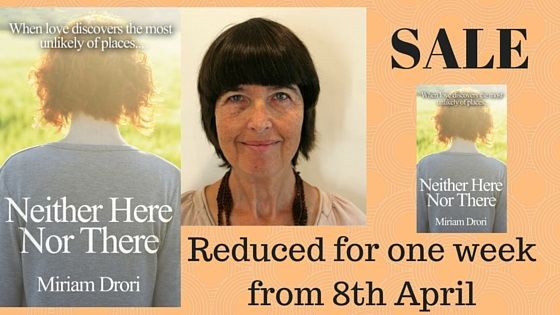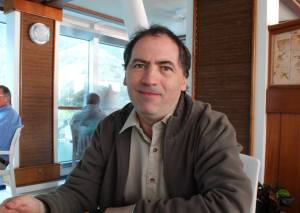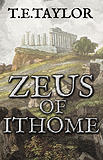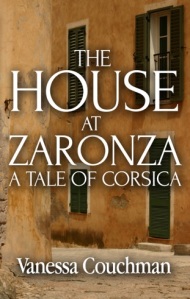
Yes, I’m interviewing myself. Why not?
Q: Hello, Miriam. I’m delighted you could join me today.
A: I’m delighted to be here. Thank you for inviting me, Miriam.
Q: Tell me about your novel, Neither Here Nor There.
A: It’s a light romance, set mostly in my home town of Jerusalem and partly in my former home town of London.
Q: Oh come on, it can’t be that light with such a background. It must involve terrorist attacks and killing and all those scary things that go on all over the Middle East.
A: No, there’s none of that in my novel.
Q: So it’s a utopian sort of novel – the way you’d like your country to be.
A: No, it depicts everyday life in present times, just as it is. The fact is, there’s so much more to life in Israel than those troubles you hear about on the news. We follow the news, of course, and we’re so very sad about the lives that are lost. But most people go about their lives without encountering any danger at all. And so the story of Esty and Mark and all the characters in my novel is perfectly realistic.
Q: So you’re saying this is just another romance.
A: No. While it can be read as a simple romance, it also brings up some complicated issues – issues most readers will recognise in some form or other.
Q: What sort of issues?
A: Arranged marriage, living in a closed community, escaping from a closed community, emigration, life-changing decisions.
Q: Yes, some serious issues there. Tell me about the closed community in your novel.
A: The haredi community. I call it that for simplicity, although within that group are several sects, some very much opposed to others. They live in various parts of the world. Many of your readers will have noticed their distinctive dress. The men wear black hats, black suits and white shirts, with tassels hanging over their trousers, and they have beards and sidelocks. There are some who wear stranger garb. The women always wear long sleeves and long skirts, and married women cover their hair with scarves or wigs. Some people even think that all Jews or all Israelis dress like that.
In Jerusalem, they used to live only in specific districts like Mea She’arim, but they’ve expanded to other areas due to lack of space. The men often don’t work, spending their time studying the holy books. That leaves the women to support their large families, as well as caring for children and doing the housework.
Q: The women must feel very bitter about that.
A: I don’t think so. Most of them believe that’s how they’re supposed to live and never question it. They’re proud to have husbands who are able to study for long hours.
Q: What about arranged marriage? How does that work?
A: I want to stress that their marriages are arranged and not forced. They’re allowed to choose their marriage partners, but their choice is limited. They’re expected to choose one out of the few they’re introduced to.
Q: Do you think that works?
A: It seems to work as much as our system of random meetings does. The divorce statistics show that. I think a couple can grow to love each other after marriage, although I don’t have first-hand experience of such a relationship.
Q: How do other Israelis regard the haredi community?
A: There’s a lot of resentment. They generally don’t have to serve in the army, and they get grants for studying, which many view as a complete waste of time. On the other hand, they do jobs that no one else wants to do. There are at least four major associations run by people from the haredi community and serving the population at large. There’s one that deals with everything surrounding burials. One that provides all sorts of medical equipment. One that provides food for hospital visitors. And one that picks up and identifies all body parts following an explosion.
I saw an accident once at a junction in Jerusalem. I looked down from the top of a hill and saw a man lying on the road, having been thrown off his motorcycle. Immediately, someone got out of a car and started redirecting the traffic. Someone probably phoned for an ambulance. Two minutes after the accident, a haredi man who happened to be passing stopped his car, took a first-aid kit out of the boot and rushed over to the victim.
Q: Well I think we’ll leave it there. Thank you for coming, Miriam.
A: Thank you, Miriam.
Neither Here Nor There, published by Crooked Cat Publishing, is available from Amazon, Smashwords, Barnes and Noble, Kobo, iTunes and elsewhere.
Miriam Drori can be found on Facebook, Twitter, Goodreads, Pinterest, Wattpad and on her website/blog.
Stop press: Neither Here Nor There is on sale for a few days on Amazon. In honour of that, several bloggers will be featuring the novel. I’ll update this post as those posts appear.
- Going from There to Here on Ailsa Abraham’s blog
- Miriam Drori on Sale on Nik Perring’s blog
- This Writer’s Life on Zeba Clarke’s blog
- Unexpected Paths on Annie Whitehead’s blog

















